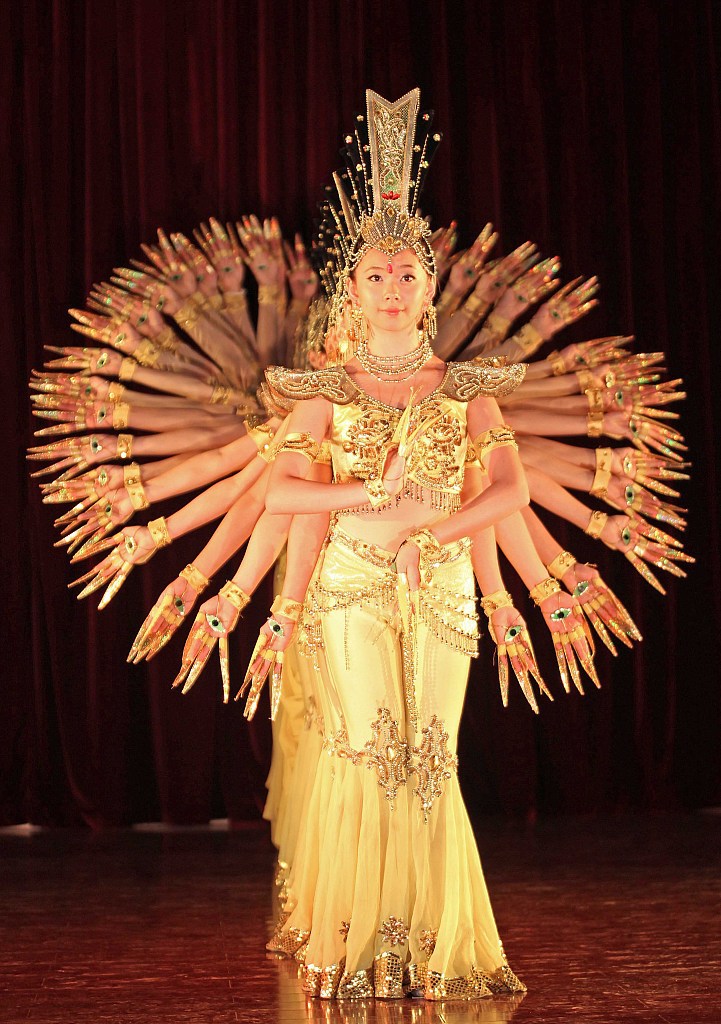Sign-language national anthem becomes instant hit
- By Zhang Rui
 0 Comment(s)
0 Comment(s) Print
Print E-mail China.org.cn, March 8, 2021
E-mail China.org.cn, March 8, 2021

Tai Lihua, a disabled dancer and national political advisor, performed China's national anthem at the opening of the fourth session of the 13th National Committee of the Chinese People's Political Consultative Conference (CPPCC) on Thursday, becoming an instant hit and causing a buzz on the internet.
Tai, an internationally acclaimed dancer who has a hearing and speech impairment, is the director of the China Disabled People's Performing Art Troupe and a member of the CPPCC national committee. In a national broadcast, she was seen "singing" the national anthem with her hands at the opening of the session in the Great Hall of the People, along with her sign language translator Hei Hong.
The scene became quite popular online, with many internet users saying they were moved to tears. "Voiceless power can also reach people's hearts," said one.
"I actually did this in the past every year when I attended the national session in Beijing. I would read every word of our national anthem in my heart, and use my hands to 'sing' with all people. This time, I feel so happy, inspired and confident," she later said via her translator.
On March 1, the China Disabled Persons' Federation, the Ministry of Education and the National Working Committee on Languages jointly rolled out a set of rules on how to present China's national anthem in sign language, the latest effort to promote the use of standard sign language among the estimated 27 million hearing-impaired people in China.
"The standard sign language rules help fulfill our wish to 'sing' our national anthem in a solemn and unified way. It is a historical progress," Tai said.
Tai also recorded a standard video to show how hearing-impaired people can perform the national anthem.
"We grew up listening to the national anthem. What the national anthem conveys is the national spirit and patriotic sentiment. It demonstrates the spirit of a country and the goal of forging ahead," she added.
Tai was born on November 1976 in Yichang, Hubei province. After an overdose of streptomycin to treat a fever at the age of two, she lost her hearing but later found fulfillment through dancing. The "Thousand-handed Goddess of Mercy," a dance performed by 21 deaf-mute dancers at the evening party held by China Central Television (CCTV) at the 2005 Spring Festival, brought Tai fame throughout China as she was the lead performer.

As a national political advisor, Tai has always been concerned about the education of disabled children. In recent years, with the introduction of relevant policies, various localities of China have actively solved the education problem of disabled children. This year she is paying more attention to the quality of education.
Tai hopes that ordinary schools can formulate more comprehensive and systematic measures for children with disabilities, and provide suitable education programs.
She believes that attention should be paid to the needs of disabled students to learn necessary cultural knowledge, and more attention should be paid to diversified development of their potential, and to enhance the social adaptability of disabled youths.
According to the data from the Ministry of Education, as of the end of 2019, the number of special education schools nationwide has increased to 2,192, up 7% over 2015, and the total number of students in schools has increased by 80% since 2015, reaching 795,000 persons. At the same time, the compulsory education enrollment rate of disabled children in China has reached more than 95%.






Go to Forum >>0 Comment(s)